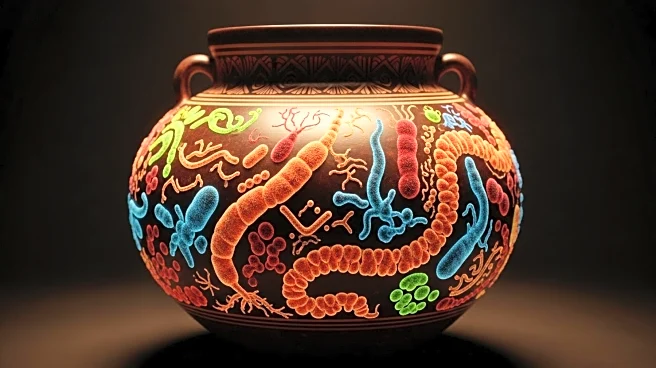What is the story about?
What's Happening?
A team of researchers has uncovered the ancient human gut microbiome from a remarkably well-preserved mummy found in central Mexico. The mummy, known as the 'Zimapán man,' dates back approximately 1,000 years and was discovered in a cave in Zimapán, a region at the edge of Mesoamerica and Aridoamerica. The mummy's preservation was due to the cave's dry and stable conditions, and it was wrapped in an elaborate funerary bundle, indicating the individual's possible high status within the Otopame culture. Using 16S rRNA-gene sequencing, researchers identified bacterial DNA fragments from the mummy's intestinal tissue and preserved feces. The study revealed several bacterial families still common in humans today, such as Peptostreptococcaceae and Enterobacteriaceae, and highlighted the presence of Romboutsia hominis, a species never before found in ancient microbiomes.
Why It's Important?
This discovery is significant as it provides insights into the microbiome of pre-Hispanic Mesoamericans, offering clues about their diet, lifestyle, and environment. The presence of certain bacteria suggests dietary patterns that included plant fibers and insect tissue, consistent with the semi-nomadic lifestyle inferred from archaeological evidence. The study contributes to understanding how human gut bacteria have evolved alongside changes in diet and culture over centuries. Additionally, the cultural aspects of the mummy's burial, such as the elaborate textiles and funerary bundle, offer a glimpse into the ritual practices and craftsmanship of ancient Mesoamerican societies.
What's Next?
Restoration efforts are underway to preserve the mummy and its funerary bundle, with plans to exhibit them to connect modern audiences with the ancient life and microbiome preserved for a millennium. The findings may prompt further research into ancient microbiomes from other regions, enhancing our understanding of human microbial evolution and its implications for modern health and disease.
Beyond the Headlines
The discovery raises ethical considerations regarding the study and exhibition of human remains, emphasizing the need for respectful handling and cultural sensitivity. It also highlights the potential for microbiome research to inform modern health practices by understanding historical dietary and environmental influences on gut bacteria.















